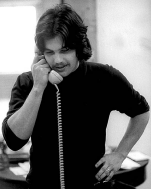This article was first
published on CLUAS in July 2004
Get it Right
Rock criticism as an art is in danger...
"Do your fucking homework, and that also means not just reading rock criticism but CRITICISM, in general; if you haven't read Dwight Macdonald's "Against The American Grain" or Randall Jarrell's poetry criticism, let alone Marcus' Mystery Train, you don't deserve your rock-critic membership card."
 Being
a rock critic ain't easy. It has its draws: if you're a promo junkie the review
copies might build several respectable wall cases of CDs. But you'll never get
rich. And you'll only be read if you're among the elite few who can actually
write well and write critically at the same time. Because we all know too many
writers who serve as little more than press release re-threading hacks bought
off on record company freebies, "exlusive" interviews and the promise of
advertising euros. Yes, about as exclusively boring as the dozen other hacks
being flown to the London Hilton for a meeting with the band.
Being
a rock critic ain't easy. It has its draws: if you're a promo junkie the review
copies might build several respectable wall cases of CDs. But you'll never get
rich. And you'll only be read if you're among the elite few who can actually
write well and write critically at the same time. Because we all know too many
writers who serve as little more than press release re-threading hacks bought
off on record company freebies, "exlusive" interviews and the promise of
advertising euros. Yes, about as exclusively boring as the dozen other hacks
being flown to the London Hilton for a meeting with the band.
"Most music criticism just makes me angry" says America's cult-popular critic
and online blogger Glenn McDonald. "I like to feel that an artist is trying to
understand something, and maybe even trying to represent some sort of approach
to understanding, not just selling units of entertainment. Magazines too often
try to homogenize their writers, either by restrictions and editing or just by
rolling so many of them together that it's nearly impossible to make sense of
individual personalities. I'd rather read about music on mailing lists and
discussion boards and random web sites, where people aren't afraid to care about
what they're saying, and have the luxury of being themselves."
The real quality of a music critic is perhaps the ability to describe their own
ideas about and emotional reactions to music, writing that makes one buy a CD.
Several generations of US music lovers have grown up listening on instruction
from the Village Voice's Robert Christgau, attuned to his inimitable blend of
judgment, passion and wit. Christgau's reviews always carry hints and warnings,
classic caveat emptors. "His writings constitute a virtual encyclopaedia of
popular music over the past fifty years. Whether honouring the originators of
rock and roll, celebrating established artists or tipping newer ones...
Christgau uniquely applies the language and ideas of academic critical theory to
popular music, minus the anal-dry language used by academics scared or incapable
of originality never mind irreverence" arts critic Laura Jamison wrote recently
in the New York Times. "Christgau's forte is his ability to write on a phalanx
of vastly different artists with equal erudition, examining the artists and
their music as both cultural products and influences... No pop act is too weird,
arty, commercial or schlocky for Christgau's contemplation."
 A
key text for any budding writer, or any discerning music fan is Lipstick Traces,
by Christgau's buddy in ink, Greil Marcus (pictured on the right). His writings
filled with a tremendous passion for US popular culture in enlightening and
heartfelt pieces. In Dead Elvis Marcus's forensic attention turns to Elvis's
continued meaning. Transmitted and justified in a splendid piece of critical
art, Marcus is profane and pitiless in a deconstruction of a cultural enormity.
There isn't a bland sentence of obligatory sentence to be seen either in In the
Fascist Bathroom: Punk in Pop Music, 1977-1992. "Brittle, lyrical, funny,
outraged and for all the untouched bases, remarkably whole. It has the feel of a
fin de si?le document" Matt Damsker wrote of the book in Rolling Stone.
A
key text for any budding writer, or any discerning music fan is Lipstick Traces,
by Christgau's buddy in ink, Greil Marcus (pictured on the right). His writings
filled with a tremendous passion for US popular culture in enlightening and
heartfelt pieces. In Dead Elvis Marcus's forensic attention turns to Elvis's
continued meaning. Transmitted and justified in a splendid piece of critical
art, Marcus is profane and pitiless in a deconstruction of a cultural enormity.
There isn't a bland sentence of obligatory sentence to be seen either in In the
Fascist Bathroom: Punk in Pop Music, 1977-1992. "Brittle, lyrical, funny,
outraged and for all the untouched bases, remarkably whole. It has the feel of a
fin de si?le document" Matt Damsker wrote of the book in Rolling Stone.
Ken Tucker wrote for The Village Voice and Rolling Stone before taking up the
pen of television critic at the mass-selling Entertainment Weekly. Mainstream
music is too often overlooked by critics as uncool argues Tucker. "By the mid
'80s, my rock-crit colleagues were most agog over bands like R.E.M. and U2, whom
I could appreciate but never felt any passion for - after punk, I could never
understand the continued appeal of the great-rock-band concept. Just around the
time that Robert Christgau was announcing his sensible theory of "semi-popular"
music, I switched over to covering the TV industry. "Semi-popular" got you
cancelled there. I re-discovered that I really liked writing about mass culture,
and I increasingly disliked the prevailing trend in rock writing. That was: pick
a subculture -post-punk, dance, hiphop, country, whatever - unearth the most
obscure examples of it, and then write hipper-than-thou panegyrics."
Music-reviewing is essentially a "service industry" at times hijacked by egos
and self-indulgence emphasises Glenn McDonald. But a revolution in technology
and easy digital access to music threatens to render many critics' work
obsolete. "We ought, I think, to have been trying to help readers find music
they might enjoy, and to do that we needed to find a way to tell them enough
about a record, in terms they could understand and use, that they could make an
informed guess about whether buying it was a good risk. We often failed, of
course, because reactions to music are intensely subjective and it's impossible
to anticipate when, for example, some particular twitch in a singer's voice is
going to completely alienate a listener who would otherwise seem to be the
band's ideal audience... The thing that threatens to render the whole field of
endeavour obsolete, however, is that if you're on the Net you now don't really
need to have music described for you. At that point, detailed written
descriptions of music are superfluous and anachronistic. A couple of 'if you
like Oasis, you might like Travis' links and some clips, and the listener can
just make up their own mind."
 The
celebrated collection of criticisms 'Any Old Way You Choose It' by Robert Christgau (pictured on the right) made a huge impact on many of the key writers
who grew up and began their trade during rock music's days of puberty, the
1970s. In his introductory essay, "A Counter In Search Of A Culture," Christgau
inspired and galvanised the formative rock writers. "Class was also an issue"
according to former Rolling Stone writer Ken Tucker. "Blue-collar Christgau came
from a working-class background and proved you didn't have to have a trust fund
to pursue a passion. On an aesthetic level, I had always liked pop (as opposed
to rock) music more than my high school friends did...but, until Christgau,
hadn't read a justification for my instincts, or understood the importance of
following those instincts."
The
celebrated collection of criticisms 'Any Old Way You Choose It' by Robert Christgau (pictured on the right) made a huge impact on many of the key writers
who grew up and began their trade during rock music's days of puberty, the
1970s. In his introductory essay, "A Counter In Search Of A Culture," Christgau
inspired and galvanised the formative rock writers. "Class was also an issue"
according to former Rolling Stone writer Ken Tucker. "Blue-collar Christgau came
from a working-class background and proved you didn't have to have a trust fund
to pursue a passion. On an aesthetic level, I had always liked pop (as opposed
to rock) music more than my high school friends did...but, until Christgau,
hadn't read a justification for my instincts, or understood the importance of
following those instincts."
"Just as I had moved to Manhattan inspired by the poet Frank O'Hara's Personism:
A Manifesto, so I was determined to do some rock writing based on Christgau's
writing. I was also inspired by Greil Marcus in Rolling Stone and in his book
Mystery Train, as well as Ellen Willis's columns in The New Yorker. They
convinced me that there was a way to write about rock in a way that could
combine a critical apparatus couched in a demotic style that appealed to me
enormously."
"...The Voice was always the place I was most comfortable writing - I had more
space, I learned a huge amount by being edited, line by line, word by word, by
Christgau - he even let you come up with your own headlines for reviews... but
to make a living, I also churned out reviews for every rock mag you can name,
including a stint as reviews-editor of Gig, which must qualify as among the most
obscure rock mags to feature major bylines and brought me into contact with
Lester Bangs, Billy Altman, and other good writers."
Albums are not being given as fair a chance today as they deserve because
publications have become too driven on brevity and easy classification, argues
Glenn McDonald. "An album could be an A+ to one person, on one particular day,
because it delivers a completely perfect encapsulation of everything they're
currently asking for from music, but to somebody else, with different needs and
prejudices, the same album could be absolutely awful...If you think your job, as
a listener or as a critic, is to stamp a C on something, or an A for that
matter, all you've succeeded in doing is impoverishing your own experience of
the music, or if you're unlucky enough to be influential about it, impoverishing
some other people's experiences of it, as well."
 The
editor's job is crucial to the critical process says Ken Tucker. "At Rolling
Stone when I worked there Jann Wenner (pictured on the right) was a
fascinatingly eclectic editor - anyone who could found an utterly sui generis
magazine like Stone and publish writers as various as Greil Marcus, Grover
Lewis, and William Greider, is an example of how to use an autodidact's
instincts for cultural good."
The
editor's job is crucial to the critical process says Ken Tucker. "At Rolling
Stone when I worked there Jann Wenner (pictured on the right) was a
fascinatingly eclectic editor - anyone who could found an utterly sui generis
magazine like Stone and publish writers as various as Greil Marcus, Grover
Lewis, and William Greider, is an example of how to use an autodidact's
instincts for cultural good."
Robert Christgau, Greil Marcus, and Simon Frith remain the most interesting
writers in rock criticism says Tucker. But admiration is due too to journalists
at daily newspapers. He points to the New York Times' Jon Pareles as one of many
"...first-rate generalists who know music-theory and make it accessible" to the
average reader while under deadline and space pressures. "I know they have to
slog out to every kind of club and stadium act, apply their ears to every
major-label release as well as ferret out the best of the indies, and not
succumb to the temptation to become blurb-machines."
"An enthusiastic piece of writing about a semi-obscure yet very mainstream
artist that described the music vividly and gave you a sense of what the
artist's body of work was like. That's the best kind of rock criticism. A whole
world opens up in writing this vivid."
Categorising and ranking music has become too common and an easy alternative to
intelligent writing argues Glenn McDonald. "Far too much criticism tries to be
an arbiter of value, in addition to, or even instead of, describing the music
and letting the reader/listener supply their own response. Witness the grades
and star-ratings nearly everybody puts on their reviews. There's no such thing
as 'a B+ album' or a three-and-a-half-star album or whatever. Value is not an
internal property of a work of art, so to me grading a record is not just inane
and offensive, it demonstrates a profound misunderstanding about how people
react to art."
Today's rock criticism lacks intelligent analysis of the current wave of
teen-pop, complains Ken Tucker "...because rock critics seem to think it's
beneath them... I look back at what Tom Smucker used to do in the Voice, writing
extremely interesting, politically-infused, gently witty pieces about un-hip
acts like Anne Murray, and you'll realize that you've never read anything as
uncondescending and revelatory about Britney or N'Sync."
Most young rock critics suffer the same weakness, suggests Tucker. "Their frame
of reference is stunted: rock began, for them, when they began to listen to it.
You think Kurt Cobain is God - fine; but tell me why Al Green isn't Jesus, then.
If you cannot discourse upon what specific Marvin Gaye recordings are important
and why, I don't care what your take on D'Angelo is. If you don't at least admit
that Chuck Berry and George Clinton are both important and enjoyable, I don't
place any store in your analysis of the Deftones or Mouse On Mars."
In Performing Rites On the Value of Popular Music, critic and academic Simon
Frith proves the co-habitability of rock criticism and academic study. Frith
demonstrated the rigour and conviction of high quality academic work polished by
the endless well-read-ness of an unassuming scholarly mind dealing in grand
themes. Sloppy writing and lazy analysis however anger critics as much as it
disappoints intelligent readers. "I hate most rock criticism too violently to
have a very good perspective on the field" says Glenn McDonald. "It feels to me,
from my own limited and subjective experience, like the bulk of mainstream
writing about music is just journalism, at this point, and most of the rest of
it amounts to a contest to see who can piss on things with the most elegant arc.
It seems like everything polarizes into sycophancy or superciliousness."
 Many
critics, including celebrated music hack Lester Bangs (pictured on the right)
was over-rated says Ken Tucker. He was "a great humorist - his interviews with
rock stars... during the period in which he was love/hate-obsessed with Lou
Reed, are magnificently, deeply funny. He was a much better writer... but as a
critic, Bangs was useless to me - his judgments were perversely arbitrary; it
was all about style, though it yielded some brilliantly funny and occasionally
seriously moving writing. But he sure as hell wasn't to be trusted as an arbiter
of good music. I think Bangs really came out of the Beat movement...out of Allen
Ginsberg's creative mantra, 'First thought, best thought.'"
Many
critics, including celebrated music hack Lester Bangs (pictured on the right)
was over-rated says Ken Tucker. He was "a great humorist - his interviews with
rock stars... during the period in which he was love/hate-obsessed with Lou
Reed, are magnificently, deeply funny. He was a much better writer... but as a
critic, Bangs was useless to me - his judgments were perversely arbitrary; it
was all about style, though it yielded some brilliantly funny and occasionally
seriously moving writing. But he sure as hell wasn't to be trusted as an arbiter
of good music. I think Bangs really came out of the Beat movement...out of Allen
Ginsberg's creative mantra, 'First thought, best thought.'"
With so much free access to music for fans there's a lot less work for critics.
Why write about music at all, asks a hypothetic Glenn McDonald. "I think the
worthwhile thing you can still do... is write about how music moves you, about
the ways you find to connect with it, and how you contrive to allow it to affect
your understanding of the world, or yourself, or break-ups or gender-politics or
the Civil War or something."
"I do write about myself, and my own fears and hopes and epiphanies, in the
course of writing about the music. Some weeks I'm much more of a diarist than a
reviewer or a critic, and I think for people who want their lives and their
music to mean something, my struggles sometimes resonate."
"I think it's incredibly important that there be a intellectual and aesthetic
dialogue about popular music, but I rarely read anything that seems to be trying
to be a part of it. Fortunately, popular music carries on its own conversation
about itself, so virtually any insight a critic might have stated, some other
record will come along and demonstrate."
![]() Now it's over to you. Join the CLUAS writing team and rise to the challenge that
is being a music critic. Just send to us an
article you've written. If it's well-written, we'll publish it. Guaranteed.
Now it's over to you. Join the CLUAS writing team and rise to the challenge that
is being a music critic. Just send to us an
article you've written. If it's well-written, we'll publish it. Guaranteed.
